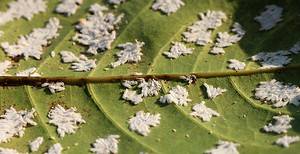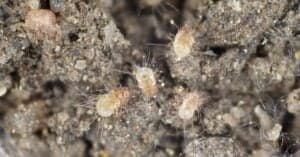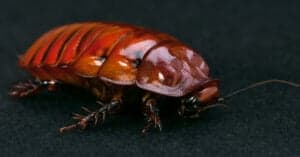Those of us with home gardens and yards may instantly recognize aphids. However, for those that don’t know, these small insects are known to hang around plants. Plants are these tiny critters’ main source of food. This is why you’ll find them in your front or backyard. They’re also known for destroying a lot of plants since they feed on them. Many houseplant owners can tell you stories of these aphids destroying their favorite plants. This is why you don’t want to have an abundance of them in your garden or around your houseplants. If you’ve been dealing with aphids, then you may also be wondering what are the main aphid predators. After all, what eats aphids?
In this article, we’ll discuss more about what aphids are and who their main predators are. You’ll learn all about the insects that feast on these little bugs and how they help curtail the destructive nature of the aphid.
Background on Aphids
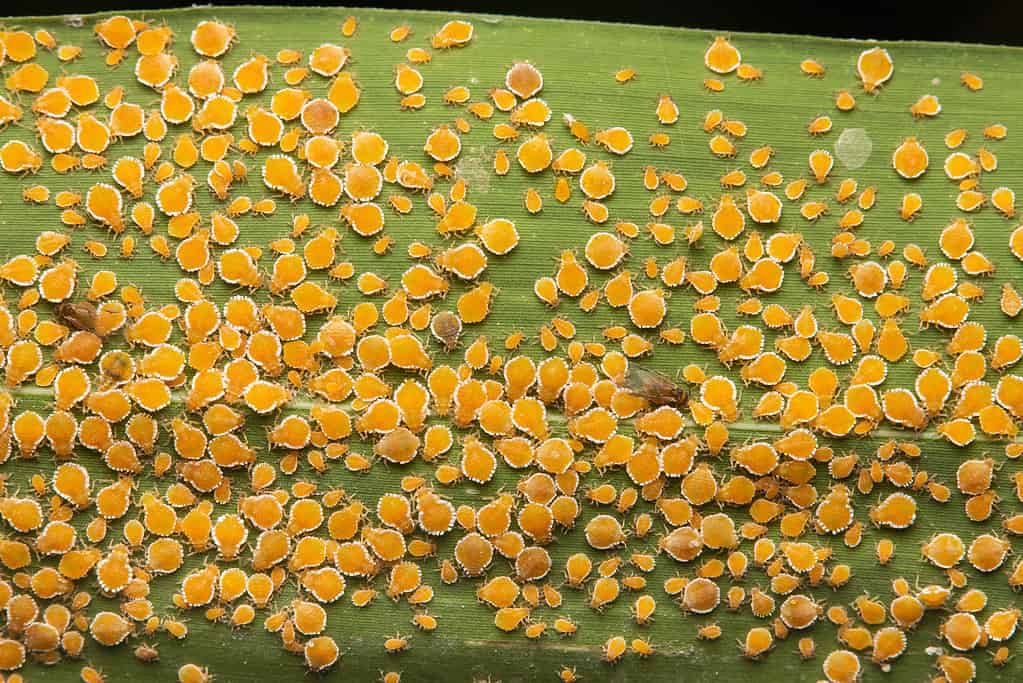
Long, thin mouthpieces afford aphids the ability to pierce leaves and stems, drawing the fluids from them.
©Somyot Mali-ngam/Shutterstock.com
So, what exactly is an aphid? An aphid is a small insect that has a soft body. These insects come equipped with long, thin mouthpieces. These mouthpieces allow them to pierce through leaves and stems in order to draw out the fluid in the plants. They will then essentially suck the plants dry. Aphids are one of the most abundant insects that you’ll find in your garden. Although they rely on the fluid inside of plants to live, in small numbers, they don’t particularly harm your plants. It is when they are hanging out in large numbers that they begin to damage the health of the plants.
You can usually tell that aphids are destroying your plants because they will begin to turn yellow or twist and curve at the leaves. Additionally, you may begin to notice that your plants are no longer growing. Since they are sucking out the fluids from the plants, they are essentially stealing the plant’s nutrients. Today, there are over 4,000 different aphid species out in the world. Each one of these species has specific plants that they prefer to attach to. So what kinds of predators ensure that aphid species don’t overrun your beautiful garden? Let’s take a look at the most common aphid predators and how they feed on these tiny insects.
What Eats Aphids?
There are a wide variety of organisms that eats aphids. However, they can mostly be classified into two distinct groups: predators and parasitoids. The difference between these two predators is pretty significant. Let’s start with explaining the most obvious one: the predator. The predator organism that feasts on aphids will kill and eat them immediately. On the flip side, the parasitoids have a much more unique way of preying on aphids. They will instead lay their eggs inside the body of an aphid. Their eggs will then feast on the aphid in order to survive. This ultimately destroys the aphid while ensuring that the eggs of the species continue growing. Let’s take a closer look at each of these predators and parasitoids and compare how they prey on aphids.
Aphid Predators: Lady Beetles
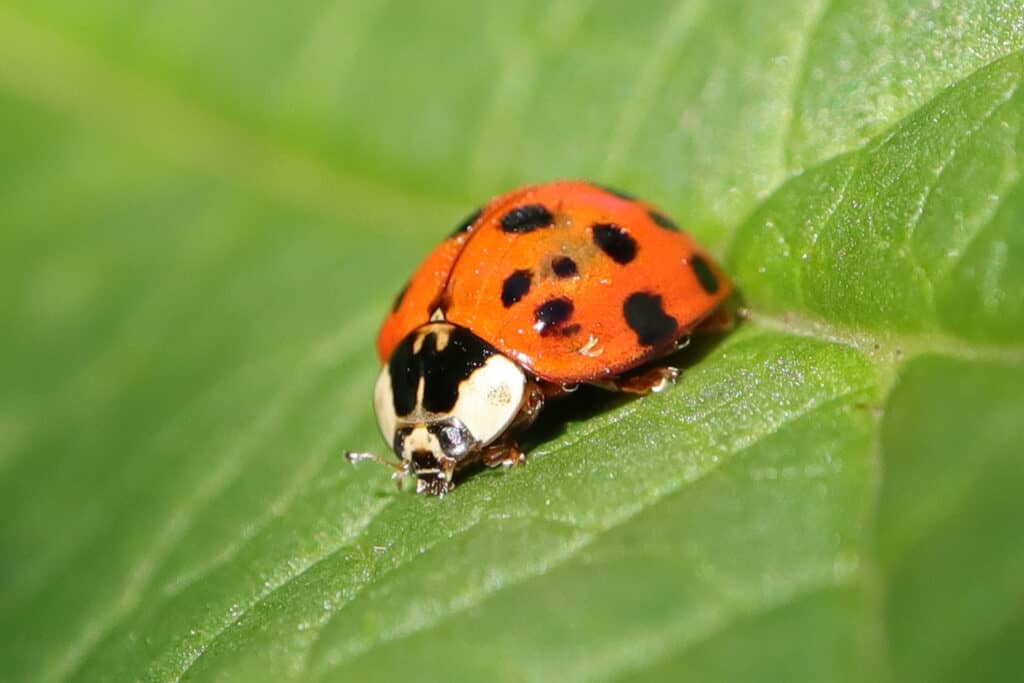
Ladybugs are also known as lady beetles and ladybird beetles.
©iStock.com/DE1967
One of the greatest enemies of an aphid is the lady beetle. Known also as the common ladybug, these insects are pretty easy to recognize. These bugs feature a bright red or orange body marked with a bunch of black dots all around. This makes them pretty easy to spot. Many of us are happy to have a ladybug land on us as they are considered one of the “cuter” insects out there. However, they are also quite deadly to aphids as they are known to eat them up! Both ladybug adults and larvae enjoy feasting on aphids. Adult ladybugs will often lay their eggs on plants where there are aphid colonies present. After the eggs hatch, the larvae will begin to feast on aphids. The feast will mostly take place at night, as lady beetles will fly away during the day.
Aphid Predators: Green and Brown Lacewings
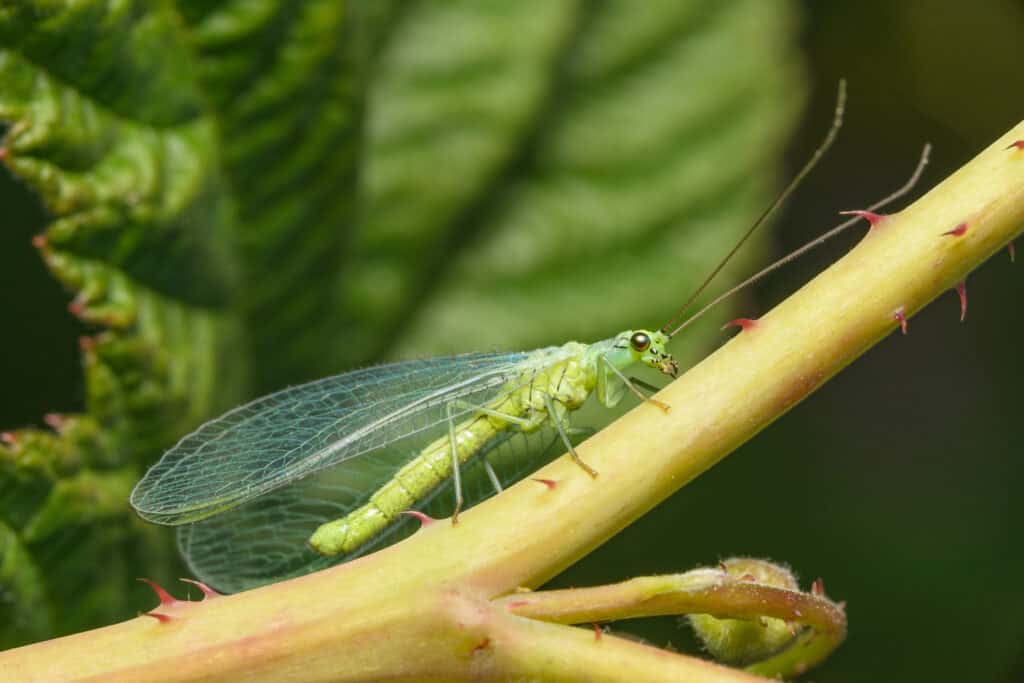
Lacewings are insects in the Chrysopidae family.
©iStock.com/Pavel Abramov
Green and brown lacewings are known for being effective pest control when used in home gardens. Adult lacewings are known for being great insects when it comes to controlling populations of aphids. These insects are known for being a dark brown or yellow color — although sometimes they can be a shade of green. They have even been nicknamed the ‘aphid lions’. Both adult lacewings and their larvae eat these tiny critters. This is because they will make sure to lay their eggs in areas where there are large aphid colonies.
However, their larvae are actually more consistently known for controlling the aphid population. They will often lay anywhere between 100 to 200 eggs at a time. So if your garden has been terrorized by invasive aphids, then you may want to look into releasing lacewings into the area. Their diet pretty much consists of aphids, although there are some species that will eat nectar, honeydew, and even pollen.
Aphid Predators: Parasitoid Wasps
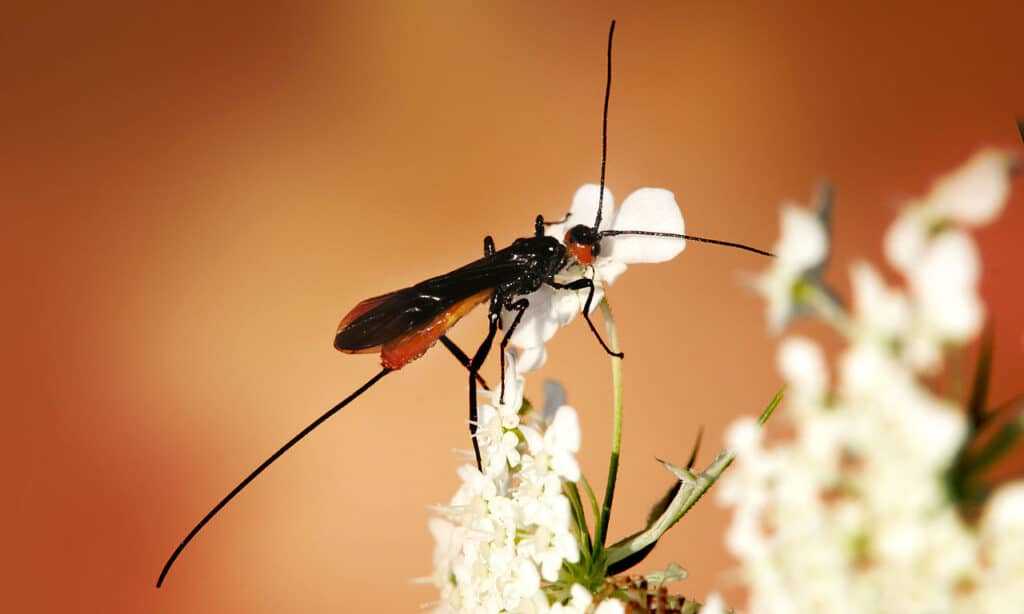
©Richard Bartz, Munich aka Makro Freak / CC BY-SA 2.5 – License
The parasitic wasp is a great example of the parasitoid type of predator that attacks aphids. Parasitoid wasps are large groups of wasps that need to lay their eggs inside of other insects. They need to do this in order to complete their lifecycle. Although this may sound hostile, they are actually incredibly important when it comes to curtailing invasive species. Additionally, it doesn’t sting or bite humans. This is because they don’t have wasps nests that they need to protect. Unlike many of the other predators we have discussed so far, these wasps do not outright attack and eat the aphids. Instead, the female wasps will lay their eggs inside the bodies of the aphids. Over time, as the larvae of the wasps grow, they will emerge out of the body of the aphid. This in turn kills the aphid.
Aphid Predators: Soldier Beetles
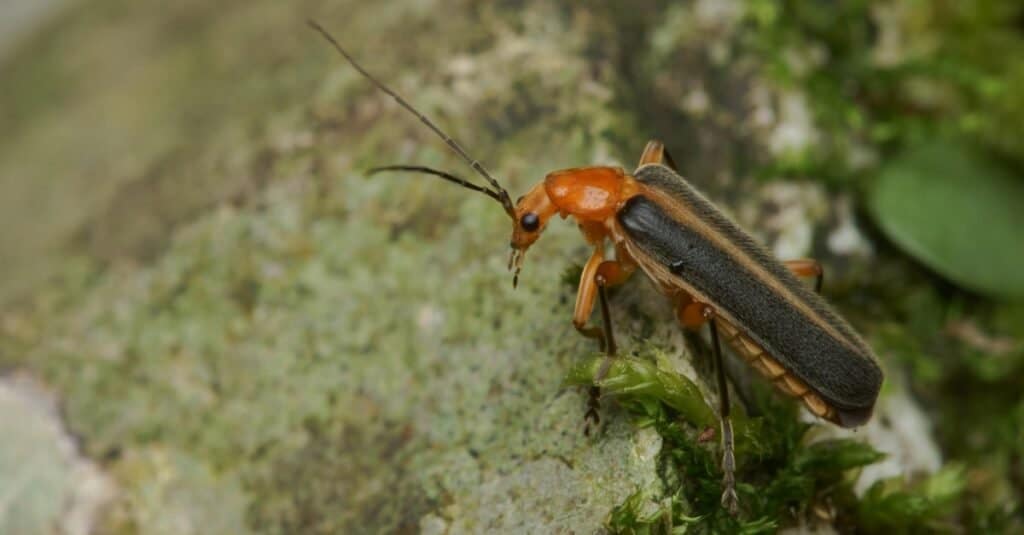
A soldier beetle is a type of beetle that secretes a toxic defensive chemical.
©Suede Chen/Shutterstock.com
Soldier beetles are incredibly beneficial insects when it comes to controlling aphid populations. These tiny beetles are often dark brown or black in color with an orange, yellow, or red head. Sometimes they are mistaken for wasps or bees — especially when they are moving around. They are known for being great pollinators as well. These beetles are known to eat both pollen and aphids. However, it is important to note that it is only the adult versions of this beetle that eat them.
Aphid Predators: Damsel Bugs
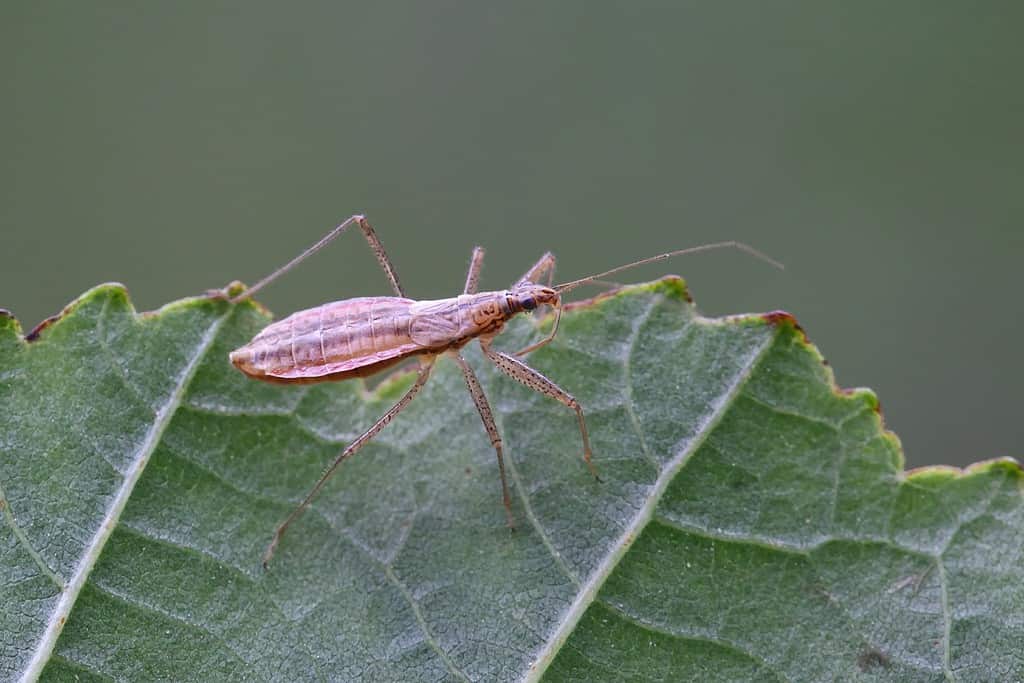
A marsh damsel bug, or Nabis limbatus.
©Henri Koskinen/Shutterstock.com
The damsel bug is a slender, long bug that is known for being a predatory insect. They naturally occur in outdoor areas such as gardens. Any area that has a lot of greenery will be a comfortable home for damsel bugs. These bugs are recognized thanks to their big eye and their long mouths along with long antennae. Their mouthpieces are known for being used to pierce their prey so that they can remove the fluids. This is how the damsel bug eats. When it comes to preying on aphids, they put their piercing mouths to work. They will pierce through the aphid’s body and suck them dry. Even more interesting is the fact that both adults and larvae of this species will eat aphids.
A List of Animals That Eat Aphids
Do you have a garden or plants that you are trying to protect from an aphid invasion? Have your plants been negatively impacted by these tiny bugs? Then it helps to know which animals happen to prey on these bugs. These are some animals that are known for controlling aphid populations:
- Predatory midges
- Green or brown lacewings
- Lady beetles
- Parasitoid wasps
- Soldier beetles
- Damsel bugs
- Hoverfly
- Soft-winged flower beetle
The photo featured at the top of this post is © Macronatura.es/Shutterstock.com
Thank you for reading! Have some feedback for us? Contact the AZ Animals editorial team.



